There is no such thing as ‘The Duopoly’
George Orwell wrote that jargon and obfuscating language contributes to the degradation of the English language to the point that meaningful dialogue is impossible.

He might have had a point, too: The term ‘fake news’, which the Reuters Institute recommended should be stripped from conversation around online misinformation, was meaningless almost as soon as it was born, allowing it to be hijacked by politicians with an anti-media bent. One of the people who coined it, BuzzFeed’s Craig Silverman, has admitted culpability in that (though he can’t really be blamed for not predicting how it was to be co-opted), and I’ve been arguing it should be retired as a term since August of last year. Because it was jargon, ‘fake news’ has made discourse about misinformation impossible.
New report, published today by @EU_Commission High Level Group on disinformation, contains: “a clear and unequivocal abandonment of the term ‘fake news’. @rasmus_kleis #fake #news https://t.co/UbKwHmW2x8
— Reuters Institute (@risj_oxford) March 12, 2018
‘Millennial’, too, has drawn ire as being completely useless as a description of an entire generation’s habits and trends. It has led to gross overgeneralisations, and many ‘Millennial-focused’ publishers turned out to actually be ‘Facebook-dependent’ publishers instead, and look how that turned out for them.
Similarly, there is a decent argument to be made that we should retire the term ‘Duopoly’ for everything except a description of where ad money is being directed. At the moment, and as a result of that ad-cash hoovering, ‘Duopoly’ is being used simultaneously to describe ‘enemies of the free press’, ‘monolithic Silicon Valley magnates’ and, yes, ‘enemies of the free press’. Yet the two companies that make up the Duopoly, Google and Facebook, actually have enormous differences with respect to each of those issues.
Take the two company’s relationships with publishers, for instance. Regardless of what you think of Google, it is undeniable that over the past two years the search giant has extended olive branch after olive branch to publishers. The end of the ‘first-click-free’ policy, the Digital News Initiative, the recent drive to support subscription models, the just-announced $300 million to help US publishers… these are all undoubtedly good things for Google’s publisher partners. They’re all tacit acknowledgment that the battle for ad dollars is over, but still.
Google appears to be making a concerted effort to replace Facebook as the news media’s best friend https://t.co/a40hv2CuvI
— CJR (@CJR) March 21, 2018
By comparison, Facebook has remained firmly in the role of the frenemy for publishers. Its rapid re- and de-prioritisation of the content which it deems necessary for its own growth, and insistence that publishers fall in line or disappear from the news feed, has made it almost impossible for any publisher to rely on the social giant (and recent news is not likely to win it any friends).
True, it has announced some initiatives that seem designed to support publishers but, as my Media Voices co-host Peter Houston has said, you have to feel sorry for its head of publisher partnerships Campbell Brown, whose every effort seems countered by some other part of Facebook’s machine working to undo those initiatives. That is exacerbated by publishers’ inflated opinion of how important they were to Facebook – the recent de-prioritisation of publisher content has seen the percentage of the newsfeed that was publisher content drop to 4%… from 5%.
The left hand of Facebook doesn’t know what its right hand is doing, then, and that’s part of the problem. How can we talk about ‘the Duopoly’ and the effect it has on misinformation and relationship with the press when both members under that banner are so monolithic and contradictory?
What, for instance, is Google? Following its restructuring in 2015, Google is now a subsidiary of Alphabet, Inc., a conglomerate that includes life sciences, VC funds and more. So when we talk about Google as part of the Duopoly, do we mean the largest part of that conglomerate, or Alphabet, Inc. as a whole?
Even within the new Google, when we talk about the company’s contribution to journalism, are we talking about the Digital News Initiative or the subscription-boosting services of the search arm of the business, or the genuinely worrying tendency for YouTube’s algorithms to feature and recommend misinformation and inappropriate content for children?
Unlike the retirement of the term ‘fake news’, I don’t think that we’ll ever stop using the term ‘Duopoly’, unless Amazon forces our hand and we change it to ‘the Triopoly’. Nor do I think it’s as pressing a matter as that was. Instead, I hope that media commenters and the CEOs of major publishing houses stop acting as though ‘the Duopoly’ was wholly bad and start talking with more nuance about the companies that upended the media ecosystem, and have the power to do so again.
Chris Sutcliffe
enquiries@trippassociates.co.uk
Martin Tripp Associates is a London-based executive search consultancy. While we are best-known for our work in the TMT (technology, media, and telecoms) space, we have also worked with some of the world’s biggest brands on challenging senior positions. Feel free to contact us to discuss any of the issues raised in this blog.